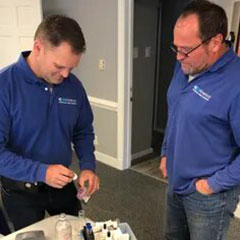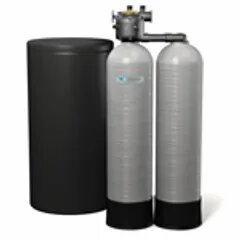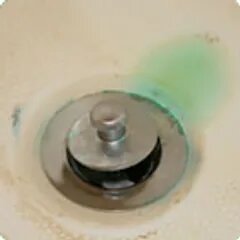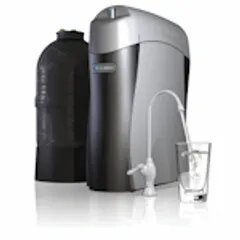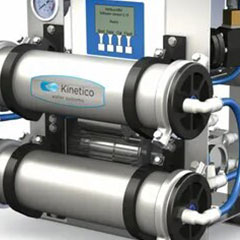How Reverse Osmosis Can Help Address Hard Water Issues
Hard water can be a real challenge for many households, turning your daily routines into frustrating experiences. From the stubborn residue on dishes to that uncomfortable feeling in your hair, hard water isn’t just an inconvenience—it can also cause long-term issues for your plumbing, appliances, and even your skin. Fortunately, there’s a solution that could make your home life a lot easier: reverse osmosis.
In this blog, we’ll take a deep dive into what hard water is, how reverse osmosis can help alleviate these problems, and why getting professional help is often the best route.
Understanding Hard Water
What is Hard Water? Simply put, hard water is water that has high levels of dissolved minerals, primarily calcium and magnesium. While these minerals aren’t harmful to your health, they can wreak havoc on your home’s water system and appliances. You might notice limescale buildup on faucets, dingy laundry, or soap that never quite lathers properly—all common signs of hard water.
Hard water is particularly prevalent in certain regions where the groundwater is rich in mineral deposits. While these minerals are naturally occurring, they can become problematic for many homeowners when they make their way into the household water supply.
The Issues with Hard Water
The effects of hard water often show up as minor annoyances at first but can lead to bigger issues down the road. Over time, mineral deposits in hard water can cause:
- Clogged Pipes: Limescale builds up inside pipes, which restricts water flow and decreases efficiency.
- Damage to Appliances: The buildup of minerals can reduce the lifespan of household appliances such as dishwashers, washing machines, and even water heaters.
- Dry Skin and Hair: Bathing in hard water can leave your skin feeling dry and your hair brittle because it strips away moisture.
What is Reverse Osmosis?
Reverse osmosis (RO) is a water purification process that uses a semi-permeable membrane to remove contaminants, including minerals like calcium and magnesium. Essentially, it’s a highly effective method of filtration that works at a microscopic level. Water passes through the RO system, leaving behind the dissolved minerals that contribute to hardness.
While reverse osmosis is not the only solution for treating hard water, it is among the most effective when it comes to delivering pure, softened water to your home.
How Reverse Osmosis Helps with Hard Water Issues
1. Effective Mineral Reduction
Reverse osmosis systems work by forcing water through a specialized membrane that blocks out minerals and other impurities. The result is purified water that’s free from most of the hardness-causing minerals. Unlike traditional water softeners, which use salt to “exchange” ions, RO simply removes the unwanted particles altogether.
With hard water, it’s not just about the visible signs of residue or buildup—it’s also about preserving the integrity of your plumbing and household systems. By filtering out the calcium and magnesium, reverse osmosis can help extend the lifespan of your appliances and keep your plumbing in good shape.
2. Better Tasting and Safer Water
Not only does RO tackle the hardness issue, but it also removes other contaminants, resulting in better-tasting water. Many people find that the purified water from an RO system tastes fresher because it lacks the metallic or “earthy” taste that sometimes accompanies hard water.
This improved quality isn’t just for drinking. It means that cooking, washing fruits and vegetables, or even making coffee is better with RO water. Additionally, the assurance of filtered water can enhance your peace of mind.
3. Protection for Appliances
Your household appliances deserve a break. Hard water can be harsh on your household appliances, leading to mineral deposits that reduce their efficiency. Reverse osmosis systems help minimize this kind of buildup, meaning that your dishwasher, washing machine, and even your coffee maker will thank you by performing better and lasting longer.
When professionals install an RO system in your home, they can often incorporate the setup in a way that supplies RO water to multiple sources—whether it’s just the kitchen tap or other strategic spots that feed into appliances, adding another layer of protection against mineral damage.
Leave It to the Professionals
Installing a reverse osmosis system isn’t really a do-it-yourself kind of project. Correct system setup involves subtleties, ranging from selecting the ideal location to integrating it with your current plumbing system. It’s best to leave this kind of installation to the experts.
Professionals can assess your unique situation and recommend the best type of RO system for your needs. Professionals possess the expertise to manage any plumbing or water supply problems in your home and guarantee an efficient installation of the unit. Plus, with professional installation, you’re less likely to run into leaks, pressure problems, or other common pitfalls of DIY attempts.
Is Reverse Osmosis Right for You?
Reverse osmosis is highly effective for addressing the mineral content in hard water, but it might not be the right solution for every household. Depending on your water quality, size of your home, and budget, there may be other options that suit you better, such as water softeners or specialized filtration systems.
Consulting a professional is the best way to determine what will work best in your specific scenario. They can conduct a water test and provide you with an overview of the necessary steps. If hard water is causing a lot of hassle, reverse osmosis could be an excellent option for both short-term relief and long-term prevention.
Conclusion
Hard water doesn’t have to be an inevitable nuisance in your household. With solutions like reverse osmosis, you can enjoy better water quality, longer-lasting appliances, and a lot fewer headaches. Reverse osmosis offers an effective way to reduce the mineral content in your water, improving everything from your morning coffee to the lifespan of your plumbing.
Remember, though, that it’s important to bring in the professionals when considering a reverse osmosis system. They will not only guarantee proper installation, but also assist you in identifying the most suitable system for your requirements. If you’re tired of dealing with hard water, it might be time to make the switch to reverse osmosis—and start enjoying cleaner, softer water every day.

